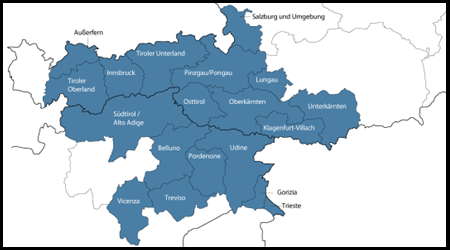What?
Interregional cooperation at the Italian-Austrian border is boosted by the presence of the Euro-region Tirolo-Alto Adige-Trentino and the European Grouping of Territorial Cooperation (EGTC) Without Borders (GECT Euregio Senza Confini). However, these institutions have found it difficult to cope with recent migrations, hindering cooperation as a result. Here, more than anywhere else, clear, universal integration measures are needed to tackle the social, political, economic and cultural challenges linked to migration.
The EUMINT (European Regions, Migration and Integration) project aims to strengthen cross-border cooperation between institutions on the border between Austria and Italy. This involves institutions at the municipal, provincial/regional and euro-regional levels. EUMINT has three different goals:
- Institutional cooperation: Promoting a direct exchange between project partners through in-person meetings, an Ideas Lab, and recommendations for institutions at all levels.
- Strengthening civic integration: Developing and testing innovative teaching materials on civic integration and training social workers and other professionals working in the field of welfare and social care. The goals are to spread this learning throughout different institutions and territories, and promote European values among asylum seekers and refugees.
- Deepening labour integration: Proposing short-term tools and long-term strategies for the integration of asylum seekers and refugees into the labour market.
Who?
Eurac Research (IT) heads a partnership of 10:
- ZeMiT, Centre for Migrants in Tyrol;
- the Institute of Geography from the University of Innsbruck;
- the EGTC Euroregio Without Borders;
- ARLeF, a public body in the Autonomous Region of Friuli-Venezia Giulia that coordinates activities that involve the safeguarding and promotion of the Friulian language across the regional territory;
- the Regio Wipptal, an administrative entity in the Italian territories of autonomous provinces which offers specific services, some related to social and health services;
- 5 administrative districts on both sides of the border
Where?
Italy and Austria in the territories of Südtirol-Alto Adige (IT), Tirol (AT), Friuli Venezia Giulia (IT), Kärnten (AT), Veneto (IT) and Trentino (IT).

How?
EUMINT is financed by the INTERREG V-A Italy-Austria with an ERDF contribution of about €1,000,000 towards the specific aim: “Strengthening institutional collaboration across the border”. The project runs from January 2018 to October 2020.
Results
Project activities facilitated network building, shared dialogue, exchange of experience and identification of collaboration possibilities.
As for institutional cooperation, stakeholders from private and public sectors were interviewed (with a total of 44 interviews) to investigate the current integration situation and future integration possibilities in the project area. Moreover, the “Ideas Lab for cross-border integration projects” even allowed for the exchange of innovative integration practices, mainly from northern countries, due to their experience with migrant integration. Both of these facilitated the creation of a report on the integration of migrants at the Italian-Austrian border and four cross-border visits in 2019. These visits enabled stakeholders to get to know projects and practices in a mutually informative exchange.
In relation to civic integration, the project has resulted in the creation of a board game “the House of Common Values”, an interactive game which explores the European common values in a safe space. The game is an opportunity for asylum seekers, refugees, and the local population to meet and share stories or personal experiences.
Finally, at the local level, an online space for job availabilities or other services that could help migrants has been designed for use by both foreigners and locals. It offers workshops for minority languages and for the improvement of cultural and professional skills. It also features an interactive map about good practices for the integration of asylum seekers, refugees and migrants. Available here http://www.foralps.eu/mapsNULL. It particularly focuses on posts that provide fixed employment with a focus on the educational and social aspects of integration.
The project’s success lies in the comprehensive engagement of stakeholders from all levels, from refugees to politicians. Only by using this approach could concrete results in integration be achieved. This success has even been acknowledged by the EU Commission, with the project being shortlisted for the RegioStars Awards 2019 under the category “Combatting inequalities and poverty”.
More information
https://www.eurac.edu/en/institutes-centers/institute-for-minority-rights/projects/eumint
- Prihlásiť sa na účely uverejňovania komentárov
- Značky
- employment education

